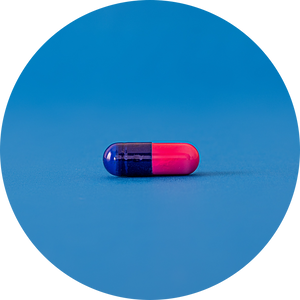Experiencing any kind of sexual dysfunction can be frustrating, embarrassing, and difficult to talk about, even with a doctor. As a result, many men don’t seek treatment for these common issues, even though there are plenty of discreet treatment options available, many of which can be ordered online (even the prescriptions!).
Still, the first part of treatment is to identify and understand the issue.
What Is Premature Ejaculation?
Premature ejaculation is when a guy reaches orgasm or ejaculates before feeling satisfied during sex. The experience is fairly common and affects about 20 to 30 percent of all guys, although this number may be even higher considering men don’t commonly report the issue to their physicians.
Premature ejaculation is also often defined as ejaculating within a minute of penetration during sex, but in some cases it may occur before penetration even begins.
Fortunately, there are quite a few treatments available for premature ejaculation: figuring out what's causing it first can help you get the best results.
What Causes Premature Ejaculation?
It might take some time to sort out what causes premature ejaculation, but in most cases it's psychological in nature. That’s not to say that there are no physical causes of premature ejaculation, but the issue is most frequently diagnosed as psychological.
There are two types of premature ejaculation:
- Primary, or lifelong, premature ejaculation begins from the start of sexual activity in life. Men who experience this type of premature ejaculation generally have trouble with rapid ejaculation starting at their very first sexual encounter and continuing throughout life. While this may be the result of a physical condition or inherited genetic traits, these cases are often triggered by some kind of psychological response to conditioning, upbringing, culture, or a previously traumatic sexual experience.
- Secondary, or acquired, premature ejaculation is when PE begins later in life. Most men generally go years without issues related to ejaculation, but in secondary PE they suddenly or gradually start to experience issues. This is often the result of a physical condition, sometimes including obesity, diabetes, high blood pressure, high cholesterol, excessive drinking, or illicit drug use; however, it can also be the result of psychological issues in relation to stress, depression, or performance anxiety.
How long the problem has been occurring will help to determine if the issue is more psychological or physical in nature. Some medical conditions or issues commonly associated with premature ejaculation include:
- Anxiety
- Hormonal imbalances
- Depression
- Diabetes
- Erectile dysfunction
- Guilt
- Inflammation or infection in the urethra or prostate
- Low self-esteem
- Nervous system conditions like multiple sclerosis
- Overactive thyroid
- Highly sensitive penis
- Problems in relationships
- Stress
If you're experiencing any of these issues, treating the underlying condition may help prevent premature ejaculation from happening.
7 Treatments For Premature Ejaculation
In the event that you're unable to identify and treat a root cause of your premature ejaculation, there are still ways to treat it. Some of the most effective methods for treating PE include:
Selective Serotonin Reuptake Inhibitors (SSRIs)
Serotonin is a neurotransmitter that acts as a chemical messenger for the brain. Along with many other functions, one of its jobs is to help delay ejaculation. A serotonin imbalance is common among people with sleeping difficulties and can result in premature ejaculation.
Selective serotonin reuptake inhibitors are a class of oral medications commonly prescribed as antidepressants because they prevent serotonin from being reabsorbed by the body. This leads to increased levels of serotonin in the body and can help to alleviate depression.
Due to this overabundance of serotonin with SSRIs, one of the most common side effects of these medications is delayed orgasm.
One study demonstrated that by increasing the dose of sertraline, a common generic SSRI, over the course of a few weeks, participants were able to experience delayed orgasms and took longer to ejaculate.
Despite these results, SSRIs have not been approved by the FDA to treat premature ejaculation. They're commonly prescribed and used "off label" for this purpose, however, meaning that physicians prescribe SSRIs for us in an indication – like premature ejaculation – that's not on the FDA approved prescribing label. Some of the most commonly prescribed SSRIs are the aforementioned sertraline (Zoloft), paroxetine (Paxil), and fluoxetine (Prozac). Some of the most common side effects of SSRIs include fatigue, excessive sweating, and diarrhea, though these symptoms are generally mild.
Topical Anesthetics
Whether in the form of a wipe, cream, or spray, applying numbing agents directly to the penis can help to decrease sensitivity and delay ejaculation. The most common anesthetics used are benzocaine, prilocaine, and lidocaine, which work by blocking transmissions to the central nervous system. These agents are applied directly to the penis 20 or 30 minutes before sexual activity begins.
For best results, wipe off the penis and clean the substance off just before sex. The accidental transfer could lead to a decrease in pleasure and satisfaction for your partner. The most common side effects are a mild burning sensation when applying and a slight decrease in sex drive.
Condoms
Condoms can help to prevent ejaculation in a few ways. By their very nature – as a barrier around the penis – they result in reduced feeling and sensation. Using thicker condoms can have an even more profound impact, and some are designed expressly for this purpose. There are also a world of condom options including those coated in the same local anesthetics mentioned above.
Using thicker condoms in addition to numbing agents can be an effective way to delay ejaculation.
Behavioral Techniques
The goal of these treatment approaches is to effectively train your body to respond differently to stimulation. Premature ejaculation can be the unintentional result of a learned habit, and breaking that habit can help to reduce frequency.
It may take some practice and getting used to, but these two methods can help with this treatment option:
- Stop-start method: Engage in typical sexual activities as normal, but once you feel the first signs of ejaculation, stop all activity and focus on something other than sex. Once you've successfully reduced excitement and stimulation, resume sexual activity. Done consistently, this can help to train you not to ejaculate so quickly.
- Squeeze method: Similar to the stop-start method, engage in sexual activity until you feel like you’ll soon ejaculate. Instead of stopping activity, you or your partner grab the head of your penis and squeeze. Squeeze gently right where the head meets the shaft. This shouldn’t cause pain but should help to decrease stimulation. Once excitement and the ejaculatory response has declined and is more manageable, resume sexual activity.
Therapy
Depending what's causing your premature ejaculation, talking with a therapist may be the ideal treatment. As PE is often the result of psychological issues, working through mental health conditions may help with premature ejaculation and improve quality of life. Additionally, premature ejaculation could be contributing to relationship issues, which can in turn increase the likelihood that PE happens again. Couples counseling can help you and your partner to deal with this experience together – and restore intimacy.
Exercises
By strengthening your pelvic floor muscles, particularly the pubococcygeus muscle, you may be able to better control your ejaculatory response and erections.
Performing Kegel exercises can be a great way to strengthen your pelvic floor.
- Locate the correct muscles. These muscles are the same that you use when trying to cut off urination midstream.
- Tighten and hold these muscles for five seconds.
- Release and rest for five seconds.
- Repeat this process ten times, and perform two to three sets like this daily.
Masturbation
While it may sound counterintuitive, masturbating more as a means to delay ejaculation can actually work when done correctly. For best results, masturbate an hour or two before engaging in sex. Most men have a refractory period after ejaculation during which it's harder to ejaculate again, typically lasting a few minutes to a few hours. Since the body will still be in the refractory period related to the previous orgasm, it can take longer to ejaculate the second time. Timing will vary from person to person.
A word of caution: masturbation too soon before sex could lead to a disinterest in sex or failure to become aroused.
The Takeaway
While it might be difficult to figure out why premature ejaculation is happening, there are plenty of easy and effective ways to treat PE. SSRIs are a common prescription medication for guys dealing with PE, but topical treatments, therapy, and some exercises can help.
Rex MD can help, too, with real medications prescribed by clinicians and shipped to your door, if approved. Click here to learn more.
SOURCES
Treatment of premature ejaculation with sertraline hydrochloride
Current therapies for premature ejaculation
Premature Ejaculation - StatPearls - NCBI Bookshelf












